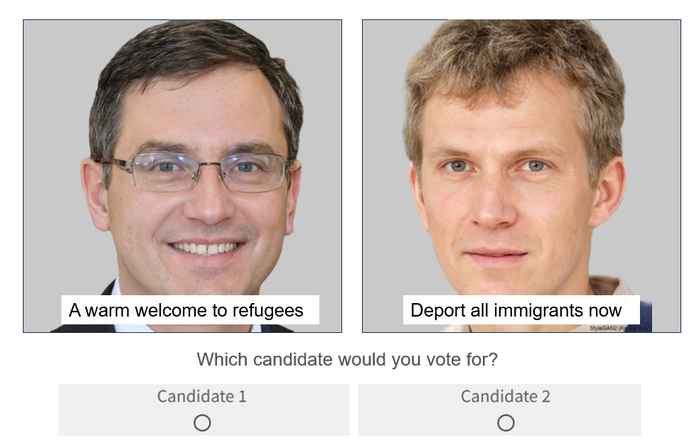Research shows a preference for happy politicians
25 April 2024

Humans are very sensitive to the emotions they can read on the faces of others. They help us determine what the other person feels and what they have in mind for us. So emotions also naturally help provide us information about politicians' intentions. But what impact do those emotions have on voters? According to Homan, more than we often think. 'My research shows that just seeing a politician evokes emotions in voters, especially if this politician also shows emotions, and that this can influence our voting behaviour.'
Measuring emotions
Homan used various instruments - from an online questionnaire about election posters to measuring brain activity and facial muscles when perceiving the emotions of politicians - to investigate how citizens respond to the emotions of politicians with their heads, hearts and behaviour. ‘An emotional response consists of several levels,’ Homan explains. 'There is a physical reaction, such as tensing certain facial muscles. We take note of and label the emotions we notice. And we exhibit certain behaviours in response.' Homan also took account of the situation in which emotions occur: 'In the case of politicians, the main question is how your emotional reaction depends on your support of or distaste for a politician.'
Our polarised views are deeply rooted in our brains
Emotions are usually very contagious. For example, if someone radiates a lot of happiness while talking, you will unconsciously look happy too. And when another person looks angry, we tense ours frown muscles. As expected, participants in the study also mirrored the emotions of unknown individuals in this way. However, something completely different happened when it came to politicians they knew. Participants responded positively to all the perceived emotions of politicians they supported and negatively to those of politicians of whom they disapproved. Homan observed corresponding emotional responses in the brain. ‘This shows that our polarised views are deeply rooted in our brain and our normally unconscious emotional responses.’
A preference for happy politicians
To determine the impact of emotions on voting behaviour, Homan presented a representative group of almost 5,000 participants in the Netherlands and America with various election posters. These posters varied in the politician depicted on them, the expression on the face, the text and the subject (from urgent issues such as climate and migration, to less charged topics such as infrastructure). For the politicians, she used images of people unknown to the participants.
A charm offensive can be effective
It turned out that it did not matter what the issue was or what position the politician held on it, participants convincingly preferred politicians with a happy facial expression and a positive tone in the text. ‘This surprised me,’ says Homan. 'I had thought that people would be more likely to choose angry politicians on political issues that matter to them. This is an interesting insight for politicians who are not yet well known: a charm offensive can be effective.'
Concluding Homan states that the emotions of politicians can have significant consequences for how voters respond to them and therefore to the political process as a whole. ‘It seems we should be paying more attention to the emotions of politicians and citizens’ reactions to them.’
Defence details
Maaike Homan: 'Citizens´ Affective, Cognitive and Behavioral Responses to the Emotional Displays of Politicians'. Supervisors: Dr G. Schumacher and Dr B.N. Bakker.
Time and location
Wednesday, 8 May, 13.00-14.30, Agnietenkapel, Amsterdam
